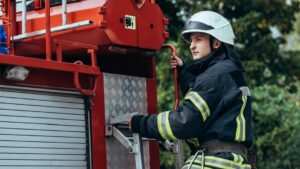Emergency medical service (EMS) personnel, such as paramedics and emergency medical technicians (EMT), selflessly give their service to protect and take care of their community every day. Unfortunately, homeownership is often just out of reach despite the vital role they play. However, thanks to special EMS mortgages and mortgage loans for paramedics, many first responders can achieve the dream of homeownership.
Key takeaways
- EMTs assess patients and provide basic health procedures with 170 hours of education.
- Paramedics are licensed pre-hospital service providers with up to 2 years of college degree and 1,000 to 2,000 hours of training.
- EMTs and paramedics face home buying challenges due to low wages despite providing life-saving services to the community.
- First responders can access various home mortgage programs, including Hero Home Programs, FHA loans, HUD good neighbor next door, and Firefighter Next Door First Time Home Buyer Program.
Difference between paramedics and EMTs
When it comes to EMS personnel, there are different levels of certification. These certification differences affect the level of care that responders can provide to community members. To better understand the differences, we look at both paramedics and EMTs.
Emergency Medical Technicians (EMTs)
The role of an EMT is to assess a patient and determine if there are any life-threatening injuries or illnesses. Their treatment options focus on basic health procedures, such as CPR, oxygen administration, stabilizing and splinting injuries, or administering epinephrine for an allergic reaction. To become an EMT, you do not need a college degree but rather complete an EMT training program requiring at least 170 hours of education.
Paramedics (PM)
Paramedics are licensed, pre-hospital service providers providing many of the same medical treatments that emergency room staff can. This can include administering medications, starting IV lines, providing airway management, EKG administration and interpretation, and much more. Paramedic training is a college degree program that can take up to two years and include 1,000 to 2,000 hours of training to complete. In many cases, these programs require a college-level anatomy and physiology course before acceptance.
Home buying challenges for first responders
Despite providing life-saving services to the community, wages for EMTs and paramedics often keep homeownership out of reach. According to a 2021 EMS1 survey, more than half of EMS personnel work more than one job. This is despite 63% working more than 50 hours a week and 21% working more than 70 hours a week.
In addition to the mental and physical stress of the job, the inability to make a living wage often leads to burnout. Unfortunately, it usually keeps many EMS personnel from owning their own home.

Home loan programs for EMS providers
The good news is there are many different home mortgage programs available for first responders, including EMTs and paramedics. These programs offer everything from down-payment assistance to reduced fees and grants to help with the down payment.
Here we take a closer look at some of the available assistance options.
Hero Home Programs – First Responder Home Loans
Hero Home Programs and their First Responder Home Loans is a comprehensive program that works with first responders to find all the possible home assistance programs they are eligible for. They research all the possible programs available to you, including down payment assistance, low-cost mortgages, and federal and local grants that are often available for first responders. Once they locate all available options, they also work with you to find the best financing options that complement the additional benefits, making your home buying and financing process much easier, with less work for you to do.
Advantages
- Research is done for you, meaning less work for you
- Credit on closing
- Additional vendor discounts
- They find all available rebates and grants
- Low-rate mortgage loans
- Maximum savings
Eligibility
The Hero Home Program is open to all EMS personnel and first responders.
FHA loans
A Federal Housing Administration (FHA) loan is insured by the Federal Housing Administration and offered by approved lenders. These loans only require a 3.5% down payment and are designed for low to moderate-income earners.
Advantages
- Small down payments
- Flexible qualifications, with the main requirements being good work. and credit history
- Acceptance of lower credit scores
Disadvantages
- Upfront Funding Fee: This is a fee of 1.75% of the total amount financed. This fee can be paid upfront or rolled into your monthly mortgage payment.
- Mortgage Insurance Premiums (MIP): MIPs are required for the life of all FHA loans.
It will cost more over the life of the loan.
Eligibility
To qualify for an FHA loan, you must have a verifiable employment history, a credit score between 500-579 for a 10% down payment or over 580 for a 3.5% down payment, and have the home appraised by an FHA-approved appraiser.
HUD good neighbor next door
The Good Neighbor Next Door program is offered by the Department of Housing and Urban Development (HUD). This program provides homes to first responders at 50% off the listing price. This means if you find a home for $200,000, you will pay monthly mortgage payments of just $100,000. This only applies to select homes in revitalized communities.
Advantages
- Purchase a home for half the asking price
Disadvantages
- Limited selection of homes available for the program
- If multiple people apply for the same home, the applicant chosen is determined by a randomized lottery
- Must stay in the home for a minimum of 3 years
Eligibility
You must be employed full-time as a firefighter, EMT, paramedic, or law enforcement officer with a fire department, EMS unit, or law enforcement agency.
Firefighter Next Door® First Home Buyer Program
If you are a first-time homebuyer or have not owned a home in the past three years, you are eligible for the Firefighter Next Door First Time Home Buyer Program. With this program, you can purchase any home on the market, and you may also be eligible for the Firefighter Next Door Grant and additional down payment assistance.
Advantages
- No application fees or up-front costs
- Easy application process
- Low down payment options
- Grants up to $8,000
- Down payment assistance up to $10,681.00
- Preferred interest rates
- Free appraisal
- Free homebuyer representation
- Discount title fees
Eligibility
The Firefighter Next Door First Time Home Buyer Program is open to all firefighters and first responders, including EMTs and paramedics.
Home buying made easier with Hero Home Programs
As you can see, there are many potential programs available to help first responders achieve their dream of homeownership. At Hero Home Programs, we want to help all those who serve our community, including EMTs and paramedics, navigate the home buying process and find all the possible assistance they can to help achieve their goal of owning a home.
Contact us online to learn more about how we can help you move into your new home for as little as possible.











